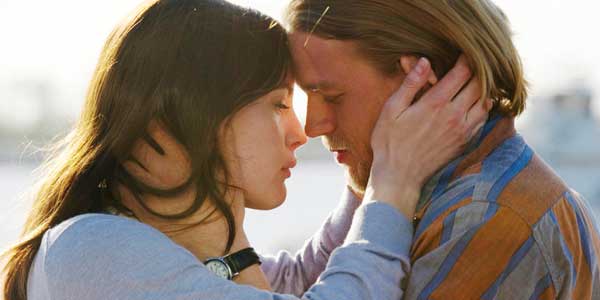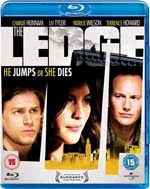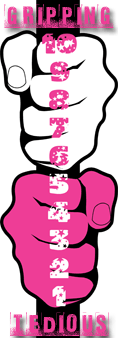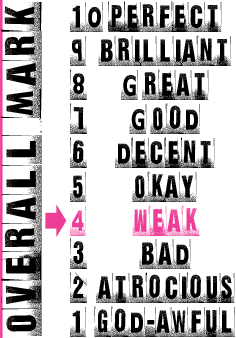
Director: Matthew Chapman
Running Time: 97 mins
Certificate: 15
Release Date: April 16th, 2012

There’s a lot of talent involved in The Ledge and you can understand what attracted the cast to this philosophical, high concept thriller, but unfortunately a script that’s muddier than it ought to be results in a film that feels as if it’s not living up to its potential.
Detective Hollis (Terrence Howard) is having a bad day, as he’s just discovered he’s infertile and that his kids are therefore somebody else’s. He’s then called to a dramatic situation where a man called Gavin (Charlie Hunnam) is standing on a ledge threatening to jump. While Hollis tries to talk him down, Gavin tells his story, which involves meeting the ultra-religious Joe and Shana Harris (Patrick Wilson and Liv Tyler). As Gavin is an atheist, their initial interactions are rather prickly, especially when Joe is openly homophobic to Gavin’s gay roommate, Chris (Christopher Gorham).
However Gavin also seems to enjoy the verbal sparring with Joe, even though they are poles apart in their attitudes. Gavin decides to ‘liberate’ Joe’s wife, slowly embarking on an affair with her. The relationship eventually turns into real love, with Shana helping to heal some of Gavin’s own demons. However this turns out to be a dangerous move when Joe discovers what’s going on, which eventually leads Gavin up onto the ledge, forced into a decision over whether to make the ultimate sacrifice.
It’s certainly an interesting set-up and presents all sorts of interesting philosophical questions, asking the audience to consider what they’d do in similar circumstances, or indeed if it’s even possible to know what you’d do until you’re faced with an extreme situation. Ultimately though it’s difficult to know what to make of these ideas due to the script’s inability to decide whether these are people or types.
Gavin is both a person and ‘the atheist’, while Joe is a person and ‘the fundamentalist Christian’, but while there are moments in the script when the characters are either a human being or what they represent, it rarely feels like those things are coming together. This results in some rather basic and static religion vs. atheism arguments (that feel rather stagey), which begin to feel as if they’re going nowhere due to the film’s uncertainty over whether it’s about religion as a monolith or about individuals and their relationship to spirituality.
This is particularly true when Joe’s fundamentalist nuttiness raises its head, as the film seems to be deliberately murky on whether it’s suggesting this sort of extreme thinking is religion’s fault or if Christianity is just being used to justify one man’s already twisted thinking. Likewise, is the fact Joe is a ‘born again’ Christian meant to suggest this particular type of Christian is more dangerous, is it a passing comment, or is it a way of saying, ‘well, we didn’t mean all Christians’?
The film’s issue often seem to be one of delineation, so that it never seems certain where it’s coming from. Some have suggested that most criticism of the film stems from anger over having an atheist hero, but while that may be true for some, the problems are more to do with the film never really coming to terms with either its characters or its ideas.
Indeed, even Gavin’s status as the hero is potentially suspect, as Joe was a bad man who has turned his life around (even if he remained controlling of his wife) and who doesn’t go off the deep end until provoked. It’s arguable therefore that the film actually says Christianity is a major stabilising force that’s only dangerous when severely provoked. Perhaps the film wants that possibility while suggesting that atheism can potentially be a morally stronger position than religious belief, but it’s all too murky to be able to tell what it’s doing, where it’s going and why. There’s nothing wrong with a script that asks the audience to do some legwork, but this one never gets to grips with its big ideas enough to be able to know what legwork the audience ought to be doing.
With all this confusion, it means that as a thriller it works but not that well. The film is reliant on creating believable characters, so that the decisions they make are believable. That doesn’t always happen here and so it rather undermines itself.
Some of the blame for the film’s weaknesses also need to be aimed at Charlie Hunnam, who takes what is potentially a very complex characters and flattens him out with a rather one-note performance. As the entire film rests on his shoulders it’s a big problem, especially when it comes to the film’s dramatic conclusion. Indeed, Hunnam may have you questioning the entire premise, as the whole thing only works if you believe that Gavin wouldn’t have told the police why he’s on the ledge right at the start, and here that becomes questionable largely due to Hunnam’s performance.
Generally in the world at the moment the quality of argument surrounding religion and religious issues is weak and unsophisticated. Film has the potential to slice through that to show what’s going on at the heart of it, but sadly The Ledge gets so caught up in its maze of moral complication that it never finds its way to the centre.
Overall Verdict: Lots of potentially interesting ideas are undermined by a script that undermines itself and which never manages to get its character to be people and a point of view at the same time. It just about works as a thriller, but not a great one.
Reviewer: Tim Isaac





Leave a Reply (if comment does not appear immediately, it may have been held for moderation)